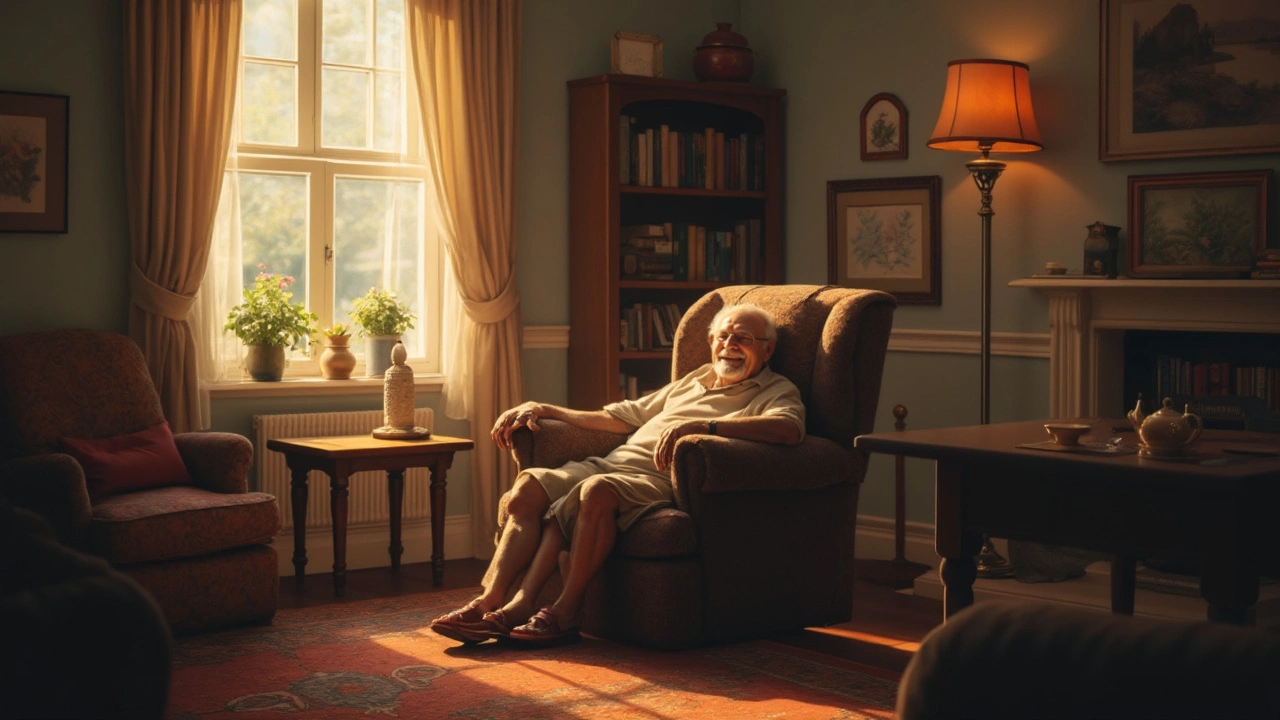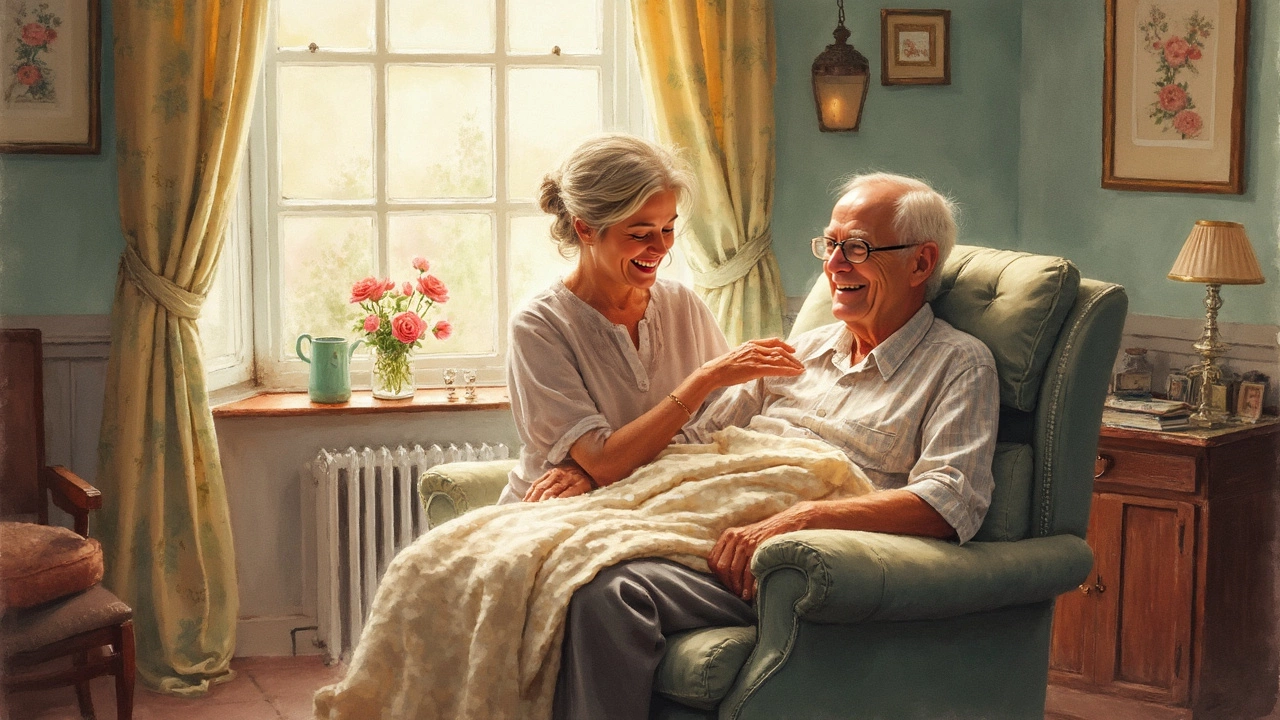 12
Feb,2025
12
Feb,2025
Ever wondered why seniors often find themselves wide awake at 3 a.m.? It's more than just those pesky habits formed over the years—there are some real reasons behind it. As we age, our bodies play all kinds of sneaky tricks, making sleep a little more elusive. It could be frequent bathroom runs, aches and discomfort, or sometimes, just a racing mind that won't switch off. These are common culprits waking seniors in the middle of the night.
Here's the thing: comfort becomes crucial. That old, reliable bed might not cut it anymore. Enter recliner chairs! They're not just for cinema lounges or lazy Sundays. For seniors, a good recliner can actually help ease some of the physical discomforts that interrupt sleep. With gentle support and the ability to adjust positions, recliners offer a new level of comfort that's been a game changer for many older adults.
- Common Causes of Night Waking
- The Role of Recliner Chairs
- Benefits of Improved Sleep
- Practical Sleep Tips for Seniors
Common Causes of Night Waking
Seniors waking up in the middle of the night isn't just by chance. There are several reasons why it happens more often than you might think. Let's break down some of these reasons.
Frequent Bathroom Trips
As we age, our bladder muscles can weaken, leading to more trips to the bathroom—something doctors call nocturia. It's pretty common and can significantly disrupt sleep, leading seniors to wake multiple times during the night. Limiting fluid intake a few hours before bedtime might help manage this.
Discomfort and Pain
Sore joints, back pain, or even restless legs can be a real nightmare, pulling seniors out of their sleep. Conditions like arthritis or general aches tend to flare up at night. A comfy sleeping environment is key. This is where a recliner chair often comes into play, offering positions that can relieve pressure points and reduce pain.
Sleep Disorders
Seniors are more prone to sleep disorders like sleep apnea or insomnia. Sleep apnea, where breathing repeatedly stops and starts, can jolt someone awake multiple times at night. It's important to talk to a healthcare provider if you suspect this. Using recliners for sleeping can sometimes ease breathing issues by elevating the head slightly.
Medication Side Effects
Let's not forget about medications. Many seniors take meds that might have pesky side effects like insomnia or the need to urinate frequently, which can keep them up. It's worth checking with a doctor if this might be affecting sleep.
Changes in Sleep Patterns
As we age, our sleep patterns naturally change. We spend less time in the deep sleep stages, making it easier to wake up during the night from noise or any little movement. Understanding this shift can help in setting realistic sleep goals.
Recognizing these factors is a big step toward better sleep. Paying attention to them and making small adjustments can hopefully lead to fewer disturbances and more restful nights.
The Role of Recliner Chairs
So, what's the big deal with recliner chairs for seniors? Well, it's all about comfort and support. As we age, sitting and sleeping in the same old position just doesn’t cut it anymore. The body needs something that adapts to its needs, and that's where recliners come in.
Recliner chairs are not only comfy, but they also provide critical support that traditional beds might lack for night waking. Many of these chairs are designed to reduce pressure, especially on those sore spots like your back, neck, and legs. The adjustable positions mean seniors can shift till they find the perfect one. No more tossing and turning!
Health Benefits
Recliners aren't just about comfort—they can be great for health too. They promote better circulation, thanks to that sweet spot between lying flat and standing. This can be especially beneficial for those with circulatory issues that often lead to swelling in feet and legs. Not to mention, these chairs can help alleviate aches from arthritis, which is a major cause of discomfort for many seniors.
Statistics and Popular Brands
Recent stats show that over 60% of seniors using a good recliner noticed a reduction in sleep disturbances. Now, that’s something to think about. Brands like La-Z-Boy and Catnapper have become popular choices in the market—not just for their style but for their ergonomic designs that specifically target the needs of aging bodies.
Choosing the Right Recliner
Picking the right recliner chair isn't just about grabbing whatever looks nice at the store. Consider factors like size, material, and adjustability. A good recliner should have enough cushioning and an easy-to-use reclining mechanism, possibly even electrical options for those who struggle with manual adjustments.
- Size: Ensure the chair fits the body properly, offering support where it's needed.
- Material: Look for breathable materials that won't irritate the skin.
- Adjustability: Prioritize chairs that offer multiple reclining angles for customized comfort.
So, there you have it. Recliners can play a significant role in improving sleep for seniors, helping reduce night waking. It’s about finding comfort, relieving pain, and ultimately, getting some well-deserved rest.

Benefits of Improved Sleep
When seniors manage to get a good night’s sleep consistently, it’s like hitting the jackpot in terms of health benefits. Quality sleep is incredibly important for everyone, but it’s crucial as we age. Let's break down why improved sleep is such a win for seniors.
Enhanced Mood and Mental Clarity
Ever notice how everything just feels a little brighter after a good night's rest? For seniors, better sleep directly affects mood and mental clarity. Without the fog from restless nights, seniors can enjoy sharper thinking, better memory, and overall improved mental health. It’s a simple yet effective way to combat the blues and keep spirits up.
Boosted Immune System
Adequate sleep gives a strong boost to the immune system. This is especially vital for seniors, who may be more susceptible to illnesses. By getting quality rest, the body can effectively ward off common colds and infections, helping seniors maintain their health throughout the year.
Physical Health Advantages
Sleeping soundly is a bit of a miracle worker on the physical side of things too. It supports healthy heart functions, reduces stress on the heart, and lowers the risk of chronic conditions like hypertension. Regular, good-quality sleep can also help with weight management, which is often overlooked but highly beneficial for overall senior health.
So, how do recliner chairs tie into this? Well, these chairs can support seniors in achieving that crucial uninterrupted rest by providing the right comfort and positioning to minimize night-time disturbances. It’s definitely worth considering if you're looking to upgrade sleep, especially for older loved ones who struggle through those restless nights.
Practical Sleep Tips for Seniors
Struggling with shut-eye as you get older? Trust me, you’re not alone. But fear not, there are ways to catch more Z’s and minimize those frustrating midnight awakenings.
Create a Comfy Sleep Environment
Your sleep zone should be an oasis of comfort. If that old mattress is like a game of whack-a-mole with lumps, consider upgrading. And don’t forget the magic of recliner chairs for a comfortable position that might just lull you into deeper sleep.
Keep Consistent Sleep Routines
Our bodies love rhythm. Going to bed and waking up at the same time every day helps regulate our internal clock. Even if you’ve had a bad night, resist the urge to nap for hours; power nap of 20 mins max, or else you risk throwing off your schedule.
Manage Your Diet and Drink
No surprise here—what you consume can mess up your sleep. Avoid heavy meals right before bedtime and watch out for hidden caffeine sources that can keep you up later than intended. Also, limiting fluid intake in the evening can help reduce those nightly bathroom trips.
Stay Active and Stretch
Activity during the day helps you sleep better at night. Simple exercises or even light stretching can reduce stress and fatigue, making it easier to wind down when it’s time to hit the hay. Just avoid vigorous exercise close to bedtime.
Relaxation Techniques
Clear your head with some relaxing rituals. Whether it’s a warm bath, some gentle yoga, or breathing exercises, find what chills you out and stick with it. Over time, these routines signal your body that it’s time to sleep.
| Activity | Time Before Bed |
|---|---|
| Heavy Exercise | 3-4 hours |
| Light Stretching | 1 hour |
| Relaxing Bath | 30 minutes |
There you have it, some straightforward tips that can really make a difference. So why not give them a try? With a bit of effort, you could be on your way to sleeping like a baby again.




